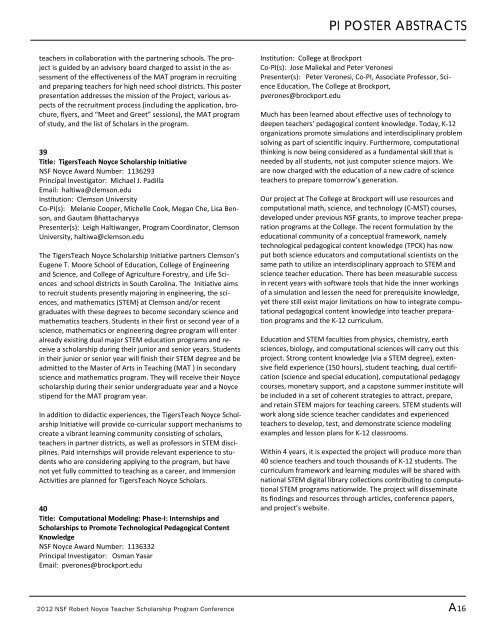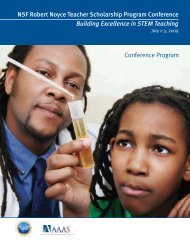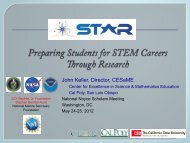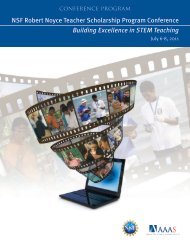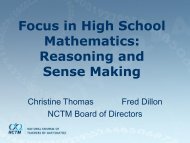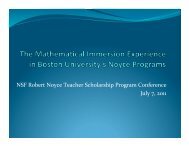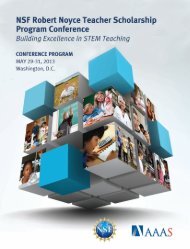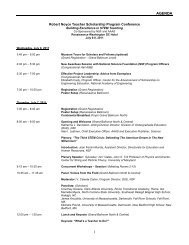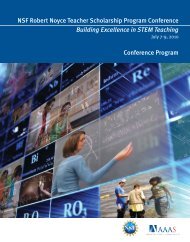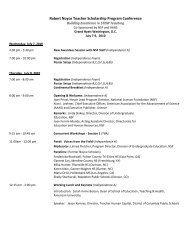2012 Noyce Conference Program - The Robert Noyce Scholarship ...
2012 Noyce Conference Program - The Robert Noyce Scholarship ...
2012 Noyce Conference Program - The Robert Noyce Scholarship ...
Create successful ePaper yourself
Turn your PDF publications into a flip-book with our unique Google optimized e-Paper software.
PI POSTER ABSTRACTSteachers in collaboration with the partnering schools. <strong>The</strong> projectis guided by an advisory board charged to assist in the assessmentof the effectiveness of the MAT program in recruitingand preparing teachers for high need school districts. This posterpresentation addresses the mission of the Project, various aspectsof the recruitment process (including the application, brochure,flyers, and “Meet and Greet” sessions), the MAT programof study, and the list of Scholars in the program.39Title: TigersTeach <strong>Noyce</strong> <strong>Scholarship</strong> InitiativeNSF <strong>Noyce</strong> Award Number: 1136293Principal Investigator: Michael J. PadillaEmail: haltiwa@clemson.eduInstitution: Clemson UniversityCo‐PI(s): Melanie Cooper, Michelle Cook, Megan Che, Lisa Benson,and Gautam BhattacharyyaPresenter(s): Leigh Haltiwanger, <strong>Program</strong> Coordinator, ClemsonUniversity, haltiwa@clemson.edu<strong>The</strong> TigersTeach <strong>Noyce</strong> <strong>Scholarship</strong> Initiative partners Clemson’sEugene T. Moore School of Education, College of Engineeringand Science, and College of Agriculture Forestry, and Life Sciencesand school districts in South Carolina. <strong>The</strong> Initiative aimsto recruit students presently majoring in engineering, the sciences,and mathematics (STEM) at Clemson and/or recentgraduates with these degrees to become secondary science andmathematics teachers. Students in their first or second year of ascience, mathematics or engineering degree program will enteralready existing dual major STEM education programs and receivea scholarship during their junior and senior years. Studentsin their junior or senior year will finish their STEM degree and beadmitted to the Master of Arts in Teaching (MAT ) in secondaryscience and mathematics program. <strong>The</strong>y will receive their <strong>Noyce</strong>scholarship during their senior undergraduate year and a <strong>Noyce</strong>stipend for the MAT program year.In addition to didactic experiences, the TigersTeach <strong>Noyce</strong> <strong>Scholarship</strong>Initiative will provide co‐curricular support mechanisms tocreate a vibrant learning community consisting of scholars,teachers in partner districts, as well as professors in STEM disciplines.Paid internships will provide relevant experience to studentswho are considering applying to the program, but havenot yet fully committed to teaching as a career, and ImmersionActivities are planned for TigersTeach <strong>Noyce</strong> Scholars.40Title: Computational Modeling: Phase‐I: Internships and<strong>Scholarship</strong>s to Promote Technological Pedagogical ContentKnowledgeNSF <strong>Noyce</strong> Award Number: 1136332Principal Investigator: Osman YasarEmail: pverones@brockport.eduInstitution: College at BrockportCo‐PI(s): Jose Maliekal and Peter VeronesiPresenter(s): Peter Veronesi, Co‐PI, Associate Professor, ScienceEducation, <strong>The</strong> College at Brockport,pverones@brockport.eduMuch has been learned about effective uses of technology todeepen teachers’ pedagogical content knowledge. Today, K‐12organizations promote simulations and interdisciplinary problemsolving as part of scientific inquiry. Furthermore, computationalthinking is now being considered as a fundamental skill that isneeded by all students, not just computer science majors. Weare now charged with the education of a new cadre of scienceteachers to prepare tomorrow’s generation.Our project at <strong>The</strong> College at Brockport will use resources andcomputational math, science, and technology (C‐MST) courses,developed under previous NSF grants, to improve teacher preparationprograms at the College. <strong>The</strong> recent formulation by theeducational community of a conceptual framework, namelytechnological pedagogical content knowledge (TPCK) has nowput both science educators and computational scientists on thesame path to utilize an interdisciplinary approach to STEM andscience teacher education. <strong>The</strong>re has been measurable successin recent years with software tools that hide the inner workingsof a simulation and lessen the need for prerequisite knowledge,yet there still exist major limitations on how to integrate computationalpedagogical content knowledge into teacher preparationprograms and the K‐12 curriculum.Education and STEM faculties from physics, chemistry, earthsciences, biology, and computational sciences will carry out thisproject. Strong content knowledge (via a STEM degree), extensivefield experience (150 hours), student teaching, dual certification(science and special education), computational pedagogycourses, monetary support, and a capstone summer institute willbe included in a set of coherent strategies to attract, prepare,and retain STEM majors for teaching careers. STEM students willwork along side science teacher candidates and experiencedteachers to develop, test, and demonstrate science modelingexamples and lesson plans for K‐12 classrooms.Within 4 years, it is expected the project will produce more than40 science teachers and touch thousands of K‐12 students. <strong>The</strong>curriculum framework and learning modules will be shared withnational STEM digital library collections contributing to computationalSTEM programs nationwide. <strong>The</strong> project will disseminateits findings and resources through articles, conference papers,and project’s website.<strong>2012</strong> NSF <strong>Robert</strong> <strong>Noyce</strong> Teacher <strong>Scholarship</strong> <strong>Program</strong> <strong>Conference</strong>A16


